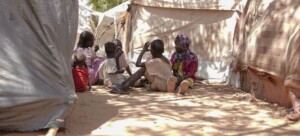Sudan announces new measures to combat COVID-19
Siddig Tawir, the acting chair of the COVID-19 Health Emergency Committee, announced several health measures to combat the spread of the coronavirus, including the suspension of studies in universities and schools for one month.
 COVID-19 entering Sudan - Cartoon by Omar Dafallah (RD)
COVID-19 entering Sudan - Cartoon by Omar Dafallah (RD)
Siddig Tawir, the acting chair of the COVID-19 Health Emergency Committee, announced several health measures to combat the spread of the coronavirus, including the suspension of studies in universities and schools for one month.
In a press briefing yesterday, Tawir said that the committee’s decisions on new measures include the banning of public gatherings, social events, and reducing the number of employees on workig sites, holding sports matches without an audience, and adhering to the COVID-19 health requirements in places of worship.
The committee also decided to ban all arrivals from India directly and for passengers from other countries who were in India at some point in the two weeks prior to arrival to limit the spread of the new Indian variation of the COVID-19 virus. The committee also decided to perform extra health checks on all passengers coming from Egypt and Ethiopia and quarantine all those who are infected.
Tawir explained that the committee based its decisions on the estimates and forecasts of the Federal Ministry of Health.
The Minister of Health, Omar El Najeeb, described the health situation as “dreadful”, and expected the number of officially registered cases to rise to 100,000 by mid-June. He also expected that the number of those who need treatment in hospitals may soon exceed 20,000, which is larger than the capacity of the health system.
Najeeb explained that the decisions aim to protect people and preserve and maintain the functioning of health institutions. He announced that it is obligatory to wear a mask under the force of law and threatened to impose fines on individuals and institutions if they fail to adhere to this measure.
The minister also talked about the expansion of the vaccination campaign with teachers being given priority.
Earlier this month, doctors in Sudan already raised alarm over an “impending health disaster” amidst the third CODIV-19 wave, medicine shortages, lack of funding, and insecurity.
Education
In the press conference at the premises of the Sudan News Agency (SUNA) yesterday, the Acting Minister of Education Tamadur El Tereifi confirmed that the basic school examinations will be held on time and that the secondary school examinations will also be held on the dates specified in advance despite the measures.
El Tereifi said that the ministry announced its commitment to the committee's decisions but also wants to take into account the current circumstances in which schools are preparing to hold class transfer exams and are nearing the end of the school year. Therefore, it was agreed to continue the examinations on their predetermined dates.
She called for the necessity of strict adherence to the health precautions by wearing masks, disinfecting spaces, and preparing an elaborate plan to administer the exams taking into account social distancing.
Higher education
The Ministry of Higher Education and Scientific Research called on university administrations to inform them of the conditions that their universities are going through and whether they require an exception from the decision to suspend studies for a month.
In a letter addressed to university administrations, the ministry said that the circumstances that warrant the exception include the completion of the admission and registration procedures, performing the announced examinations, and conducting the necessary administrative work.
The University of Khartoum administration already announced that all the examinations announced at the bachelor's, diploma, and postgraduate levels are to be held on time.











 and then
and then